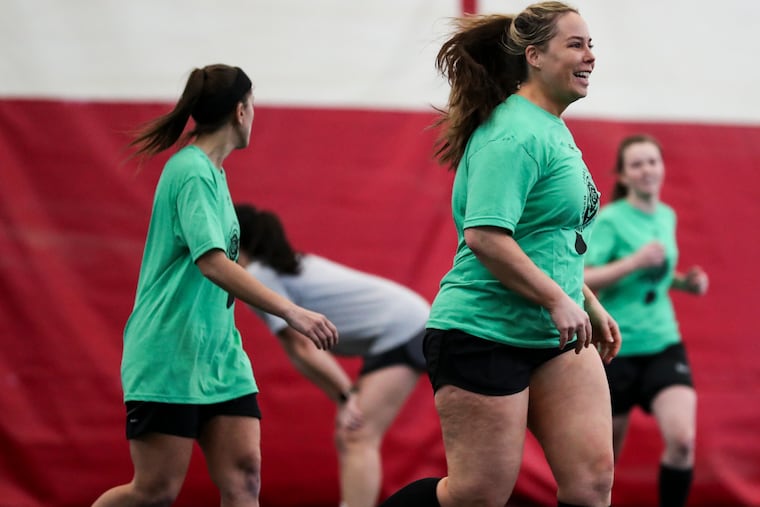Creating space for Philly’s women’s and nonbinary soccer community
Sunday’s Women’s Empowerment Cup celebrated the city’s women and nonbinary players, with proceeds benefitting the nonprofit, Safe-Hub.

Over the sounds of shouts and grunts, Olivia Rodrigo and Doja Cat bumping on a speaker, referee whistles and soccer balls hitting the back of nets, Lauren Ackerman thought about how unique of a space she was in on Sunday afternoon — a soccer tournament for women and nonbinary players.
Ackerman played in Sunday’s Women’s Empowerment Cup, an annual event hosted by CASA Soccer Leagues at Temple University to celebrate the women and nonbinary soccer community in Philadelphia. This year, the 5 on 5 tournament was divided into three divisions — two women’s and nonbinary divisions based on skill level, and one mixed-gender division called “mixto”.
“We’re all just here to play the game. We want everyone to feel comfortable.”
“This is the first time that we’ve had a competitive amateur division,” Ackerman, 32, said of the women’s soccer scene in and around Philly. She plays in CASA’s weekly women’s and nonbinary league with her team, South Philly SOL. “The men would have six leagues,” she joked.
The South Philly fifth and sixth grade teacher played soccer in high school and college, but ever since, it’s been harder to find a competitive environment just for women. “You had to play co-ed”, Ackerman said, explaining that while those leagues and teams are fun, it’s not quite like the teams she played for in school.
“It’s just different. You feel like you have to prove something.”
While Sunday’s tournament was a celebration, its existence highlights the very problem that Ackerman spoke of. For all of the progress made towards equity for women’s sports, there are still major disparities in access and opportunity.
Before that gap shows up in adult recreational leagues, it starts with girls’ sports. According to research from the Women’s Sports Foundation, about 75% of high school boys participate in sports, while only 60% of girls do. 43% of girls have never played a sport, compared to 35% of boys.
“Women may not feel like they’re put to the forefront very often,” said Kristin Lepley, CASA’s director of women’s and nonbinary soccer. She said that CASA’s participants are roughly only 2% women, and 1% gender non-conforming players. “So [for] this tournament, we really thought it was important to highlight women.”
» READ MORE: Ahead of the Unity Cup Final, soccer means everything to Philly’s Liberian community
Lepley added that including nonbinary athletes in that spotlight was crucial, too. Women’s soccer communities traditionally have taken the lead on creating a more inclusive, equitable and welcoming environment in sports — like when the United States Women’s National Team showed support for trans rights just last month, or years ago when USWNT player Megan Rapinoe became one of the first professional athletes to kneel during the National Anthem in solidarity with Colin Kaepernick’s protest against police brutality.
“There hasn’t always been room for us. And so usually people who are in the women’s soccer community are more accepting,” Lepley said.
“I think the diverse gender expressions and diverse backgrounds of soccer players and sports players in general create that understanding of, we’re all just here to play the game. We want everyone to feel comfortable.”
That spirit extended from the tournament itself to another cause. Proceeds from the Women’s Empowerment Cup benefitted Safe-Hub, a soccer-based youth and community development nonprofit. Safe-Hub pairs after-school soccer programming for boys and girls with services and assistance to their families, like grocery distributions, at its weekly practices in Kensington.
The money raised from the tournament is going specifically to Safe-Hub’s programming for girls, ensuring that there are enough coaches, equipment and recruitment to make sure it thrives.
“What we’re finding is that if we can really intentionally create these safe spaces for girls, it’s going to help... retention, [and] word will spread. Girls will want to stay involved,” said Elizabeth Clinton, the development manager with Safe-Hub Philadelphia.
One of those girls is Ariel Cruz, 11, from West Kensington. Ariel and her family joined other Safe-Hub families and players at the tournament to play a showcase game during a break in the action. She and her two brothers, who also play with Safe-Hub, had never played soccer before joining. “It’s been a great experience. They’re always helping out,” said Ariel’s father, Gregorio Cruz, about Safe-Hub.
As the Cruz family watched a playoff game for the women’s and nonbinary competitive division, Ariel remembered some of her favorite moments with the group; most weren’t directly soccer-related, like the group’s Easter egg-hunt or Halloween celebration. She’s loved her new sport, and has made new friends through it, too.
“First I was shy, but now I’m more open to people,” she said, before turning her eyes back to the game.